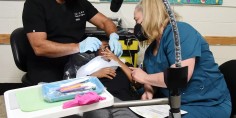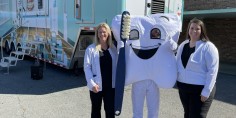In the Carolinas, most mental health specialists work in cities. But mental health issues, substance abuse, and developmental disabilities occur all across the region, leaving rural residents to struggle with conditions that can impact every area of their lives.
Support from The Duke Endowment is helping to make it easier for residents to find mental health care at their doctors’ offices.
In Henderson, N.C., one licensed therapist is at the forefront of the effort. Sandi Gray-Terry, who holds a master’s degree in social work and is a licensed clinical social worker, coordinates three doctors’ offices for the ICARE Partnership, a group working to expand mental health services across the state. The partnership’s name represents the type of health care system it seeks to develop: Integrated, Collaborative, Accessible, Respectful and Evidence-based (ICARE).








